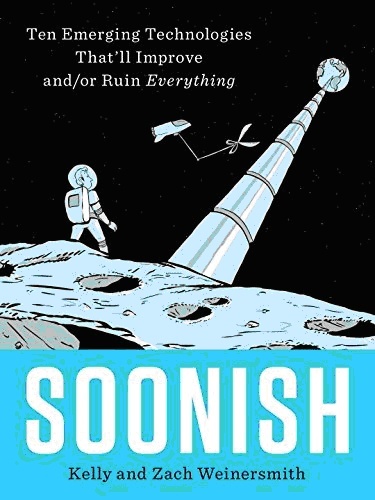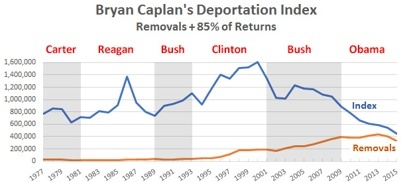Bryan Caplan's Blog, page 85
March 6, 2017
Soonish by Kelly and Zach Weinersmith, by Bryan Caplan
 My co-author, Zach Weinersmith, and his wife, Kelly Weinersmith, have a new book out on future technology and its economic and social implications. News flash: Soonish is currently at #3 on Amazon. As Neo said, "Woh."
My co-author, Zach Weinersmith, and his wife, Kelly Weinersmith, have a new book out on future technology and its economic and social implications. News flash: Soonish is currently at #3 on Amazon. As Neo said, "Woh."(0 COMMENTS)
San Diego Immigration Debate, by Bryan Caplan
P.S. I may be able to run an RPG in San Diego while I'm in town. If you're interested, email me.
(5 COMMENTS)
March 2, 2017
Power-Hunger, by Bryan Caplan
your accomplice in the wood chipper. And those three people in Brainerd.
And for what? For a little bit of money. There's more to life than a
little money, you know. Don't you know that?"
What economics teaches is not that greed is good, but that good incentives transform this questionable motive into awesome results. Greed plus property rights plus competition plus rationality plus reputation is good. Greed alone is film noir.
In Public Choice, also known as "economics of politics," we usually assume that politicians are motivated not by greed, but by power-hunger. Of course, we rarely utter the word "power-hunger." Instead, we call it "vote maximization," just as we call greed "profit maximization." But when Public Choice pictures politicians, it pictures humans filled with lust for power.
Is this a reasonable picture of politicians' psyches? Absolutely. That politicians crave power is as undeniable as that businesspeople crave profits. If you look at political history before the rise of democracy, we see virtually nothing other than dictators struggling to cement their power internally and expand their power externally. When these dictators lost wars, they lost territory and subjects, because virtually every dictators wanted to rule over as much land and as many people as possible.
Under democracy, politicians are less candid about their motives; they need us to like them, and power-hunger is not likeable. But given its ubiquity throughout most of political history, can we really believe that the motive of power-hunger is no longer paramount? One of my favorite political insiders privately calls politicians of both parties "psychopaths" - and he's on to something. Rising high on the pyramid of power is hard unless love of power fuels your ascent.
In a randomly-selected social environment, power-hunger - like greed - is brutal. Just look at the history of warfare in all its hideousness - the endless bloodbaths over slivers of territory. Remember how leaders terrorized their rivals, their potential rivals, their imagined rivals. It's sickening. If Fargo were a war story, and Marge Gunderson hunted war criminals, she might have sadly mused, "So that was Sarajevo on the floor in there. And I guess those were
your accomplices in the mass grave. And those three hundred thousand people in Bosnia.
And for what? For a little bit of power. There's more to life than a
little power, you know. Don't you know that?"
In dictatorships, the causal chain from power-hunger to bad results is obvious. The fundamental question of Public Choice is: Does democracy motivate power-hungry politicians to do good despite their bad intentions? My admirable nemesis, Donald Wittman, tirelessly argues Yes, but to no avail. Democracy out-performs dictatorship, but that's damning with faint praise.
Once you thank the stars you aren't ruled by Louis XIV or Lenin, a grim truth remains: democracy gives power-hungry politicians far worse incentives than the market gives greedy businesspeople. Above all, voters - unlike consumers - have no incentive to be rational, spurring power-hungry politicians to preach and practice endless demagoguery. It's gotten worse lately, but it's always been terrible. Democracy hasn't turned politicians into decent human beings; it's only gilded their age-old power lust with altruistic hypocrisy.
So what can we do about our predicament? There are no easy answers, but I know where to start. Like alcoholics, we must admit we have a problem. Throughout history and around the world, the wicked rule. We should stop admiring them - especially the politicians on "our side" - and see them for the reprobates they are.
(8 COMMENTS)
March 1, 2017
Read Meer, by Bryan Caplan
 Today's speaker at the Public Choice Seminar is Jonathan Meer of Texas A&M, one of my favorite young empirical economists in the world. He's doing the most innovative work on the minimum wage, wisely building on the ubiquity of firing aversion. He's also doing creative and multi-pronged work on education, charity, labor, and health economics. All his research is conveniently accessible right here. Enjoy!
Today's speaker at the Public Choice Seminar is Jonathan Meer of Texas A&M, one of my favorite young empirical economists in the world. He's doing the most innovative work on the minimum wage, wisely building on the ubiquity of firing aversion. He's also doing creative and multi-pronged work on education, charity, labor, and health economics. All his research is conveniently accessible right here. Enjoy!(1 COMMENTS)
February 28, 2017
My Deportation Index: The Drum Critique, by Bryan Caplan

His critique begins with some some data I didn't know about.
The next step is to calculate this as a percentage of the number of illegal immigrants in the country each year. Here it is:
 His punchline:
His punchline:This is approximate, since the total population of illegal immigrants isIt's a thought-provoking point. For the typical immigrant, justified fear of deportation peaked under Reagan, then almost continuously declined. But when we're playing Lord Acton ("Suffer no man and no cause to escape the undying penalty which history
a little fuzzy before 2000. But it's close enough. Obama still has a
higher removal rate and a lower index rate than any other president, but
the winner for the title of Deporter-in-Chief is...Ronald Reagan. Every
president since then has been successively more tolerant of a large
undocumented population.
has the power to inflict on wrong"), does it make sense to adjust for the population of potential victims? Or should we just count the victims? I honestly don't know.
(7 COMMENTS)
February 27, 2017
Trump Bet Clarification, by Bryan Caplan
If DonaldWhen re-reading the bet, however, I realized that I omitted a key understanding of the bet. After consulting with my partner, we've amended the terms to reflect our original intent. It now reads:
Trump resigns, is removed by the Senate after impeachment, or otherwise
is permanently removed as per the the 25th Amendment, or if it never happens
that he takes the Oath of office as POTUS on Jan 20, 2017, the BC owes [redacted] $350.
Otherwise, [redacted] owes BC $100".
If DonaldNote that this revision is entirely adverse to my interests. In fact, as I said before, I think Trump's death is my most probable losing scenario.
Trump dies in office, resigns, is removed by the Senate after impeachment, or otherwise
is permanently removed as per the the 25th Amendment, or if it never happens
that he takes the Oath of office as POTUS on Jan 20, 2017, the BC owes [redacted] $350.
Otherwise, [redacted] owes BC $100".
(1 COMMENTS)
February 23, 2017
Who's the Real "Deporter in Chief"?, by Bryan Caplan
The distinction is not entirely cosmetic. If you re-enter after Removal, you face a serious risk of federal jail time if you're caught. If you re-enter after a mere Return, you generally don't. But Return is still almost as bad as Removal, since both exile you from the country where you prefer to reside. Since I've previously suggested that we should count each Return as 85% of a Removal, I've constructed a "Deportation Index" equal to Removals + .85*Returns to capture the substance of U.S. immigration policy. Check out the numbers:
Year
Removals
Returns
Deportation Index
1977
31,263
867,015
768,226
1978
29,277
975,515
858,465
1979
26,825
966,137
848,041
1980
18,013
719,211
629,342
1981
17,379
823,875
717,673
1982
15,216
812,572
705,902
1983
19,211
931,600
811,071
1984
18,696
909,833
792,054
1985
23,105
1,041,296
908,207
1986
24,592
1,586,320
1,372,964
1987
24,336
1,091,203
951,859
1988
25,829
911,790
800,851
1989
34,427
830,890
740,684
1990
30,039
1,022,533
899,192
1991
33,189
1,061,105
935,128
1992
43,671
1,105,829
983,626
1993
42,542
1,243,410
1,099,441
1994
45,674
1,029,107
920,415
1995
50,924
1,313,764
1,167,623
1996
69,680
1,573,428
1,407,094
1997
114,432
1,440,684
1,339,013
1998
174,813
1,570,127
1,509,421
1999
183,114
1,574,863
1,521,748
2000
188,467
1,675,876
1,612,962
2001
189,026
1,349,371
1,335,991
2002
165,168
1,012,116
1,025,467
2003
211,098
945,294
1,014,598
2004
240,665
1,166,576
1,232,255
2005
246,431
1,096,920
1,178,813
2006
280,974
1,043,381
1,167,848
2007
319,382
891,390
1,077,064
2008
359,795
811,263
1,049,369
2009
391,341
582,596
886,548
2010
381,738
474,195
784,804
2011
386,020
322,098
659,803
2012
416,324
230,360
612,130
2013
434,015
178,691
585,902
2014
407,075
163,245
545,833
2015
333,341
129,122
443,095
Notice: Despite the rise in Removals under Obama, Returns crashed. Obama's Deportation Index therefore falls as soon as he takes office - and then declines further every single year! By 2015, Obama's D.I. is half its 2009 value, and about one-third of its previous peak under Bush II.
Does this mean Democrats are the genuine friend of the immigrant? Not exactly. Here are the average D.I.s for every president from Carter to Obama. The last column adjusts for population in millions, which, as you can see, makes the pattern even more extreme.
President
Average D.I.
Average D.I./Pop/10^6
Carter
776,019
3,471
Reagan
882,572
3,718
Bush I
889,657
3,534
Clinton
1,322,215
4,861
Bush II
1,135,175
3,861
Obama
645,445
2,068
Yes, while Obama has the lowest D.I. of any president over the last four decades, the real Deporter in Chief was none other than fellow Democrat Bill Clinton. Adjusting for population, no one else even comes close. Indeed, while I'm very confident that Trump's D.I. will exceed Obama's, it's far from clear that Trump will manage to displace Clinton from the top spot. (Betting odds: I'll give 4:1 that Trump's average D.I. when he leaves office will exceed Obama's, but only even money than he'll exceed Clinton's).
The lesson, as usual, is that we should look past surface rhetoric to the bedrock of numbers. While both Democrats and Republicans casually equate Clinton and Obama, their immigration policies were as different as day and night.
(4 COMMENTS)
February 22, 2017
Do Middle-Class College Kids Already Have a UBI?, by Bryan Caplan
My reply: While middle-class parents do commonly provide ample financial support for their children, it's nothing like a UBI. Instead, it's heavily means-tested: We'll keep supporting you as long as you pursue a responsible path. "Either stay in school and get passing grades, or get a job and pay rent" is perhaps the typical deal. Many parents add further micromanagement: To receive support, you need high grades, a realistic major, sobriety, and a suitable boyfriend. Only a minority agree to let their children live as they please at their parents' expense. When they do, the results seem pretty bleak. I know of no systematic data on never-employed single 30-year-olds living in their parents' basements, but the anecdotal evidence is chilling. Even parents who provide "unconditional" support ultimately tend to lose patience and angrily switch to old-school "sink-or-swim." And who could blame them?
Will might decry this as "paternalism," but a subtler analysis is in order. For starters, the heart of paternalism is treating adults like children. But parents' obvious reply is, "We're treating our kids like children because they're acting like children." Until you are self-supporting, demanding full autonomy is just chutzpah. In any case, pure self-interest also urges us to impose conditions on our dependents' behavior. "If you want to sleep on my couch, you'd better get to your job interview on time" need not be motivated by my desire to give you a "happy life full of hard work." Maybe I just want my couch back.
To circle back to my broader theme, if people who love you have good reason to impose conditions on their voluntary assistance, people who've never even met you have overwhelming reason to impose conditions on their involuntary assistance. And involuntary assistance is the heart of the welfare state.
(8 COMMENTS)
February 21, 2017
UBI Debate Video, by Bryan Caplan
(0 COMMENTS)
February 20, 2017
Why Libertarians Should Oppose the Universal Basic Income, by Bryan Caplan
Libertarians
have a standard set of fundamental criticisms of the welfare state.
1. Forced
charity is unjust. Individuals have a
moral right to decide if and when they want to help others.
2. Forced
charity is unnecessary. In a free
market, voluntary donations are enough to provide for the truly poor.
3. Forced
charity gives recipients bad incentives.
If the government takes care of you, you're less likely to take care of
yourself by work and saving.
4. The cost
of forced charity is high and growing rapidly, leading to a future of exhorbitant
taxes or financial crisis.
Taken
together, I think these criticisms justify the radical libertarian view that
the welfare state should be abolished. But this is an extremely unpopular view, so it's
natural for libertarians to consider more moderate reforms like the Universal
Basic Income. And when you're
considering moderate reforms, the right question to ask isn't: "Is it ideal?"
but "Is it better than the status quo?"
My claim:
the Universal Basic Income is indeed worse than the status quo. In fact, all the fundamental criticisms of
the welfare state apply with even greater force.
1. Some
forced charity is more unjust than other forced charity. Forcing people to help others who can't help themselves - like kids from
poor families or the severely disabled - is at least defensible. Forcing people to help everyone is not. And for all
its faults, at least the status quo makes some
effort to target people who can't help themselves. The whole idea of the Universal Basic Income,
in contrast, is of course to give money to everyone whether they need it or
not. Of course, the UBI formula normally
reduces the net payment as income rises; but if a perfectly able-bodied person
chooses never to work, the UBI gravy train never stops.
2. The UBI is
an extremely wasteful form of forced charity.
Helping the small minority of people who can't help themselves doesn't
cost much. Giving an unconditional grant
to every citizen wastes an enormous amount of money. If you were running a private charity, it
would never even occur to you to "help everyone," because it's such a frivolous
use of scarce charitable resources.
Instead, you'd target spending to do the most good. And unlike the UBI, the status quo makes some effort to so target its resources.
3. Overall,
the UBI probably gives even worse
incentives than the status quo. Defenders
of the UBI correctly point out that it might improve incentives for people who
are already on welfare. Under the status quo, earning another $1 of
legal income can easily reduce your welfare by a $1, implying a marginal tax
rate of 100%. But under the status quo,
vast populations are ineligible for most programs. Such as?
You guys! If you're an
able-bodied adult, aged 18-64, who doesn't have custody of any minor children, the
current system doesn't give you much.
Switching to a UBI would expand the familiar perverse effects of the
welfare state to the entire population - including you. And if taxes rise to pay for the UBI, the population-wide
disincentives are even worse.
4. A
politically acceptable UBI would be insanely expensive. Libertarian economist and UBI advocate Ed
Dolan has a detailed, fiscally viable plan to provide a UBI of $4452 per person
per year. But every non-libertarian I've
queried thinks it should be at least $10,000 per person per year. Even with a one-third flat tax, that implies
that a family of four would have to make $120,000 a year before it paid $1 of
taxes. This is pie in the sky.
But doesn't
the UBI give people their freedom? In
some socialist sense, sure. But
libertarianism isn't about the freedom to be coercively supported by strangers. It's about the freedom to be left alone by
strangers.
If abolition
of the welfare state is extremely unlikely and the UBI is worse than the status
quo, does this mean libertarians should accept the welfare state as it is? Not at all.
There's a straightforward moderate path to a freer world: AUSTERITY. Cut benefits.
Restrict eligibility. Remind the
world of the great Forgotten Man: the taxpayer.
We probably can't convince the majority to end the welfare state. But "Welfare should be limited to genuinely
poor people who can't help themselves" has broad appeal - and unlike the UBI, it's
a clear step in the libertarian direction.
Bryan Caplan's Blog
- Bryan Caplan's profile
- 374 followers



